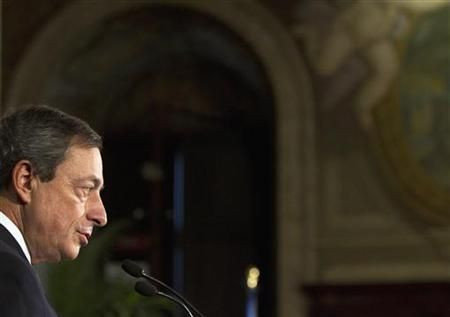Draghi Faces Maelstrom on Debut as ECB President

Mario Draghi faces a storm at his first policy meeting as European Central Bank president on Thursday but is unlikely to be pushed into a dramatic ramping up the bank's response to the escalating euro zone crisis.
European leaders said they were prepared for Greece to leave the euro zone to preserve their 12-year-old single currency if Athens does not decide quickly to implement a bailout program, putting the likes of Italy and Spain, and even France, firmly in the markets' sights.
Europe's ultimatum to Greece, after Prime Minister George Papandreou's decision to call a referendum on a bailout plan, has deepened the crisis and raised pressure on the ECB, which many analysts see as the only institution with the firepower to bring calm.
A change in interest rates is unlikely at the meeting of the ECB's 23-member Governing Council, which is now underway, just two days after Draghi took over the ECB presidency in the midst of a crisis that now threatens to engulf his native Italy.
More fundamental will be any indication Draghi gives about the ECB's bond-buying program.
Draghi succeeded France's Jean-Claude Trichet as ECB chief on Tuesday -- a day that saw the ECB buy Spanish and Italian bonds but barely manage to cap a rise in yields on the debt of the euro zone's third largest economy.
The premiums investors have to pay to hold Italian and French 10-year government debt over benchmark German Bunds rose to their highest in the euro era on Thursday with signs growing that the Greek government may fall.
Financial markets will be listening carefully to Draghi for any signals on whether he stands ready to carry on, or even scale up, the ECB's bond-buy program, a controversial tool that has led to the resignation of two German policymakers.
Draghi must balance an eagerness to curry favor with the German contingent at the ECB against growing financial market pressure to intervene on a bigger scale to lower the borrowing costs of Italy and Spain.
I think the best we can hope for at this stage is that he says the bond buying is ongoing, said Nomura bank economist Jens Sondergaard.
Trichet had signaled that the central bank was keen to withdraw from the bond-buying policy once the euro zone's EFSF rescue fund gained new powers to intervene on bond markets.
Draghi, who will look out from the ECB's Frankfurt headquarters at an encampment of protesters, demonstrating against the dominance of the financial sector, is also under some political pressure to intervene from the euro zone's high debt nations.
They need to go into the market and say they have a wall of money here and no matter how much speculation there is we are going to keep buying Italian bonds and any other bonds that are threatened, Ireland's Finance Minister Michael Noonan told state broadcaster RTE.
I think they will (do that). I don't think they have any choice with the Greek situation, he said.
Draghi appeared to indicate last week that he stood ready to help tackle the debt crisis by going on buying the bonds of troubled states, though Trichet told Reuters the Italian's remarks had been over-interpreted.
RATES RIDDLE
The majority of 70 economists polled by Reuters a week ago expected the ECB to hold its key interest rate at 1.5 percent at Thursday's meeting while preparing the ground for a 25-basis points cut in December.
News of the Greek referendum has since changed the landscape, however, and some see a chance of a cut.
I'd say a 25 percent rate chance of a rate cut would be our central forecast, said Sondergaard, pointing to data released on Wednesday showing a downturn in euro zone manufacturing in October was deeper than previously thought.
Royal Bank of Scotland economists saw a 60 percent chance of a 25 basis point cut in interest rates.
Trichet said last month the Governing Council had discussed lowering interest rates but opted not to.
The Dutch central bank, whose chief will attend Thursday's ECB meeting, said on Wednesday the risks of a global recession had increased as Europe's debt crisis and lower economic growth hurt investor and consumer confidence.
The recession risk must be balanced against stubborn price pressures in the euro zone, where inflation stayed at 3.0 percent for a second month running in October, holding well above the ECB's target of close to, but below, 2 percent.
That makes it harder for the ECB to cut rates immediately.
We think we are in an environment where, when the data finally comes out on the real economy, it will probably show GDP contracted in the fourth quarter, said RBS economist Nick Matthews.
The conditions are there for the ECB to be cutting rates ... It is definitely possible (that the ECB cuts on Thursday) but we have to recognize that it might actually be they would rather wait and see the December staff projections.
The ECB's next update of its staff projections for economic growth and inflation in December could offer a platform for Draghi to communicate a future rate cut and economists will be looking for clues for such a step at Thursday's meeting.
(Editing by Mike Peacock)
© Copyright Thomson Reuters 2024. All rights reserved.





















